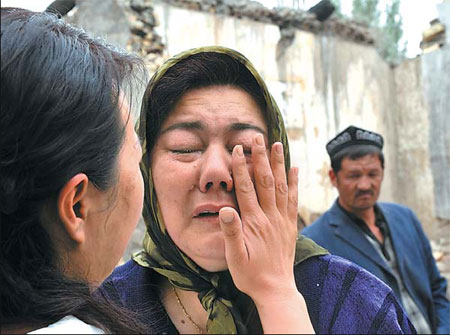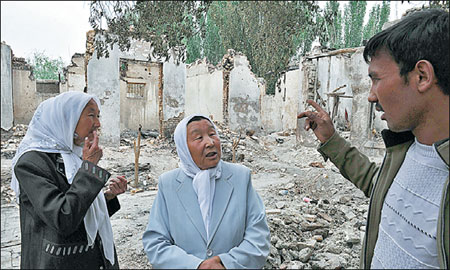Recalling pain from day of horror
Updated: 2013-05-02 07:23
By Cui Jia (China Daily)
|
|||||||||||
Blackened bloodstains
The police allowed the public to visit the house in Selibuya township on the afternoon of April 27. Many relatives of the dead arrived to see the place where their loved ones had died.
Most of the six-room house was burnt to a cinder and only a few walls were left standing. The wind carried the smell of burned wood and paper, from charred books. Splatters of blackened blood were still visible on the door, which bore a traditional Uygur pattern. Everything reminded the onlookers of the horror.
Atikan Awaili, 50, the aunt of Tayer Ahat who was in charge of public security in the Yingbazha community where the house is situated, was shocked by the scene and began to cry uncontrollably. Everyone else fell silent, many with tears in their eyes.
 |
|
Relatives of victims killed last week during the terrorist attack in Kashgar, the Xinjiang Uygur autonomous region, mourn at the scene of the attack. Zhen Shixin / for China Daily |
"I was teaching at a local primary school when I heard the news of the attack. I never imagined in a million years that one of my relatives would be among the dead," she said. "How could such a thing happen? Everything has changed, not only for my family but also for the town."
Yingbazha community covers 527 households. It had 15 community workers, but now only nine are left.
Xie Wuzhong, 33, was appointed Party chief of the community the day after his predecessor, Liu Xuliang, was killed in the attack. The site of the bloodshed is just around the corner from the community office.
"Community workers definitely need to be better equipped and protected. We are at high risk," said the retired soldier, standing in Liu's old office. "I think our security team also needs to be armed. We only have batons and shields, while the terrorists had knives and explosives. The community is on the front line of the (counter-terrorism) battle in Xinjiang."
The Xinjiang government will focus on investing in the community, because regional stability depends on the public's efforts to maintain social order, a course of action that has proved effective said Nur Bekri, chairman of the Xinjiang region, speaking at a service on Monday to honor the 15 dead as "anti-terrorism warriors".
Zhang Chunxian, Party secretary of the Xinjiang region said those who died were heroes. They sacrificed their lives to prevent a potentially lethal major attack.
The ID photos of the old community team still hang on the wall of the service hall where residents apply for social insurance, file complaints and seek help to resolve problems. All services continued as usual the day after the attack, said Xie.
Grieving families
Kurbansar Abdulsamet, the eldest daughter of 43-year-old Yeregul Memet, one of the murdered community workers, said she hadn't realized her mother's job could expose her to so much danger.
"I only know how hard she worked. She always brought work home in the evening. She even saved up to buy a computer, just for work," she said.
Memet Kadar, Yeregul's father, wrapped a white cloth around his hat as a sign of mourning for his daughter.
 |
|
A man from the Yingbazha community describes the events of April 23 to relatives of Nurmemet Turson, who was killed in the incident. Photo by Zhen Shixin / for China Daily |
"She came to see me every day; once at noon and again in the afternoon. I still can't get used to not seeing her. I often feel that she could walk into the house any minute," said the 79-year-old Muslim, staring at the entrance to his courtyard.
He said he invited Yeregul to attend a wedding on the fateful day, but she told him she couldn't ask for a day off because her workload was so heavy. "The house where the wedding took place is only about 200 meters away from where the attack happened, but she wouldn't have died if she had come along with me.
"I called her at noon to see if she had time to join me for lunch, but I couldn't get through. I thought she must be in a meeting," he said. After the wedding celebrations, he went home and waited in vain for his daughter to arrive. The bad news came at around 9 pm.
Abulimit Turson, 40, had just attended the burial of his brother Nurmemet, a community security officer who was also killed in the attack. "As Muslims, the dead should be buried as quickly as possible, but my brother was buried four days after his death because the police had to conduct a DNA test," he said.
"How could anyone do such a horrible thing to another person? No one has right to do that." He cried as he gripped an empty mineral water bottle tightly in both hands. "The terrorists need to be punished. To be honest, I really want to kill them myself, but instead I will abide by the law."
Related Stories
11 more Xinjiang terrorist suspects captured 2013-04-30 00:25
Xinjiang attacks masterminded by terrorists 2011-08-01 13:44
14 rioters shot down in Xinjiang attack 2011-07-20 06:57
Mobs attack Xinjiang police station 2011-07-18 18:56
16 die in Kashgar terror strike 2008-08-05 17:04
Today's Top News
China's automaker to open 1st US plant
Two preschool girls die from poisoning
Academic elected into US science academy
Beijing acts on complaints against airport cabbies
Military denies expensive vehicle had new plate
Police in major crackdown on tainted meat
Joint fund on hunt for investment opportunity
A-share firms' overall profits flat-lining
Hot Topics
Lunar probe , China growth forecasts, Emission rules get tougher, China seen through 'colored lens', International board,
Editor's Picks

|

|

|

|

|

|





